MLC707 Commercial & Corporations Law - Case Study: Contract Analysis
VerifiedAdded on 2023/06/13
|18
|5083
|322
Case Study
AI Summary
This case study delves into the intricacies of contract law, specifically focusing on the principles of promissory estoppel and frustration of contract within a commercial context. It examines two primary issues: whether Visit Victoria is obligated to make extra payments to Gareth based on a subsequent promise and the impact of unforeseen events like volcanic eruptions on contractual obligations. The analysis draws upon key legal precedents such as Hughes v Metropolitan Railway and Central London Property Trust Ltd v High Trees Ltd to argue that Visit Victoria is indeed obligated to fulfill the promise due to the application of promissory estoppel. Furthermore, the study explores whether Gareth is legally bound to compensate Peninsula Tours, referencing cases like Nicholl and Knight v Ashton, Eldridge & Co to discuss the doctrine of frustration of contract. The paper concludes that Visit Victoria is obligated to make the extra payment due to the unambiguous promise, while Gareth may not be liable for compensation if the contract's performance was genuinely frustrated by unforeseen circumstances.

qwertyuiopasdfghjklzxcvbnmqwertyui
opasdfghjklzxcvbnmqwertyuiopasdfgh
jklzxcvbnmqwertyuiopasdfghjklzxcvb
nmqwertyuiopasdfghjklzxcvbnmqwer
tyuiopasdfghjklzxcvbnmqwertyuiopas
dfghjklzxcvbnmqwertyuiopasdfghjklzx
cvbnmqwertyuiopasdfghjklzxcvbnmq
wertyuiopasdfghjklzxcvbnmqwertyuio
pasdfghjklzxcvbnmqwertyuiopasdfghj
Commercial and Corporations Law
Assignment one
26-Apr-18
(Student Details: )
(Word Count: 4058)
opasdfghjklzxcvbnmqwertyuiopasdfgh
jklzxcvbnmqwertyuiopasdfghjklzxcvb
nmqwertyuiopasdfghjklzxcvbnmqwer
tyuiopasdfghjklzxcvbnmqwertyuiopas
dfghjklzxcvbnmqwertyuiopasdfghjklzx
cvbnmqwertyuiopasdfghjklzxcvbnmq
wertyuiopasdfghjklzxcvbnmqwertyuio
pasdfghjklzxcvbnmqwertyuiopasdfghj
Commercial and Corporations Law
Assignment one
26-Apr-18
(Student Details: )
(Word Count: 4058)
Paraphrase This Document
Need a fresh take? Get an instant paraphrase of this document with our AI Paraphraser
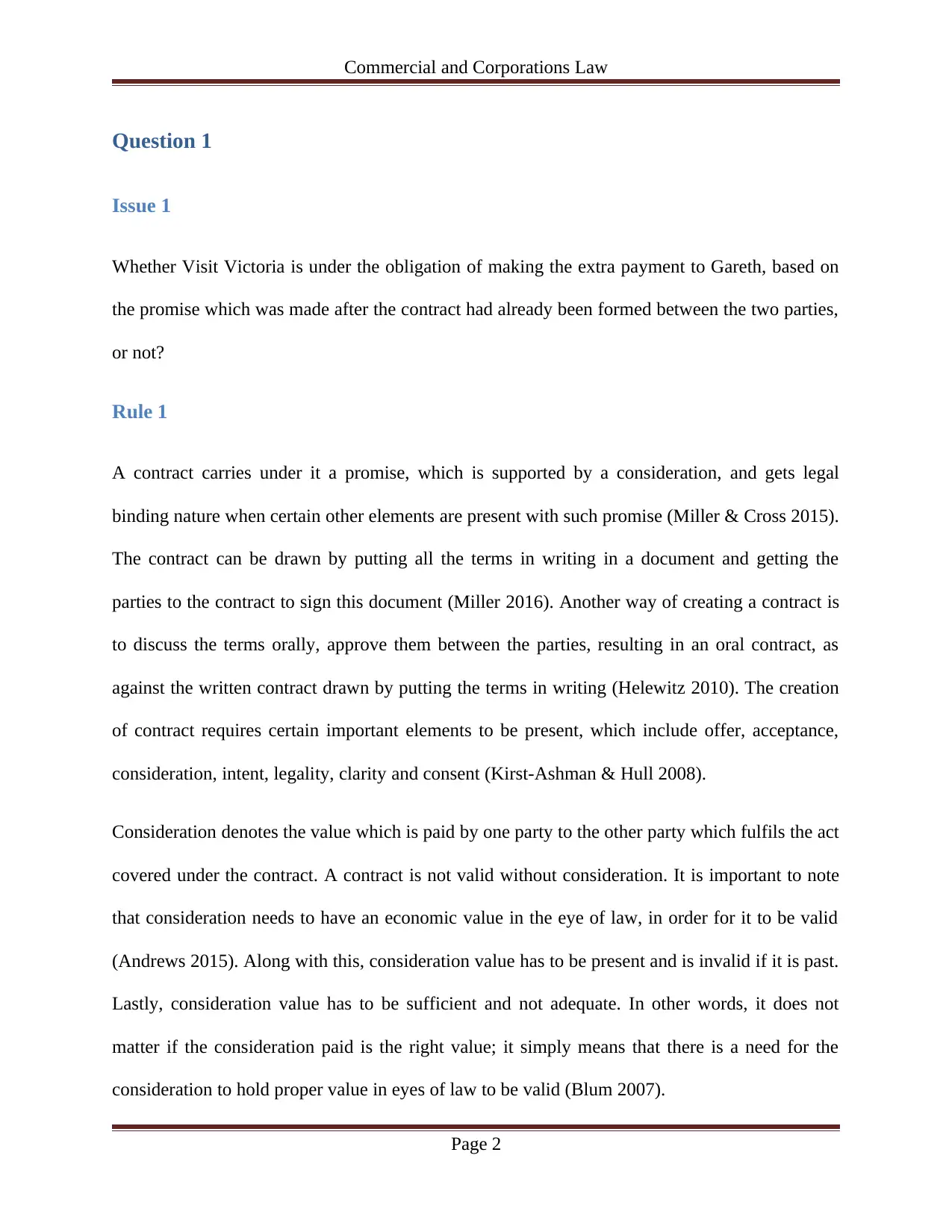
Commercial and Corporations Law
Question 1
Issue 1
Whether Visit Victoria is under the obligation of making the extra payment to Gareth, based on
the promise which was made after the contract had already been formed between the two parties,
or not?
Rule 1
A contract carries under it a promise, which is supported by a consideration, and gets legal
binding nature when certain other elements are present with such promise (Miller & Cross 2015).
The contract can be drawn by putting all the terms in writing in a document and getting the
parties to the contract to sign this document (Miller 2016). Another way of creating a contract is
to discuss the terms orally, approve them between the parties, resulting in an oral contract, as
against the written contract drawn by putting the terms in writing (Helewitz 2010). The creation
of contract requires certain important elements to be present, which include offer, acceptance,
consideration, intent, legality, clarity and consent (Kirst-Ashman & Hull 2008).
Consideration denotes the value which is paid by one party to the other party which fulfils the act
covered under the contract. A contract is not valid without consideration. It is important to note
that consideration needs to have an economic value in the eye of law, in order for it to be valid
(Andrews 2015). Along with this, consideration value has to be present and is invalid if it is past.
Lastly, consideration value has to be sufficient and not adequate. In other words, it does not
matter if the consideration paid is the right value; it simply means that there is a need for the
consideration to hold proper value in eyes of law to be valid (Blum 2007).
Page 2
Question 1
Issue 1
Whether Visit Victoria is under the obligation of making the extra payment to Gareth, based on
the promise which was made after the contract had already been formed between the two parties,
or not?
Rule 1
A contract carries under it a promise, which is supported by a consideration, and gets legal
binding nature when certain other elements are present with such promise (Miller & Cross 2015).
The contract can be drawn by putting all the terms in writing in a document and getting the
parties to the contract to sign this document (Miller 2016). Another way of creating a contract is
to discuss the terms orally, approve them between the parties, resulting in an oral contract, as
against the written contract drawn by putting the terms in writing (Helewitz 2010). The creation
of contract requires certain important elements to be present, which include offer, acceptance,
consideration, intent, legality, clarity and consent (Kirst-Ashman & Hull 2008).
Consideration denotes the value which is paid by one party to the other party which fulfils the act
covered under the contract. A contract is not valid without consideration. It is important to note
that consideration needs to have an economic value in the eye of law, in order for it to be valid
(Andrews 2015). Along with this, consideration value has to be present and is invalid if it is past.
Lastly, consideration value has to be sufficient and not adequate. In other words, it does not
matter if the consideration paid is the right value; it simply means that there is a need for the
consideration to hold proper value in eyes of law to be valid (Blum 2007).
Page 2
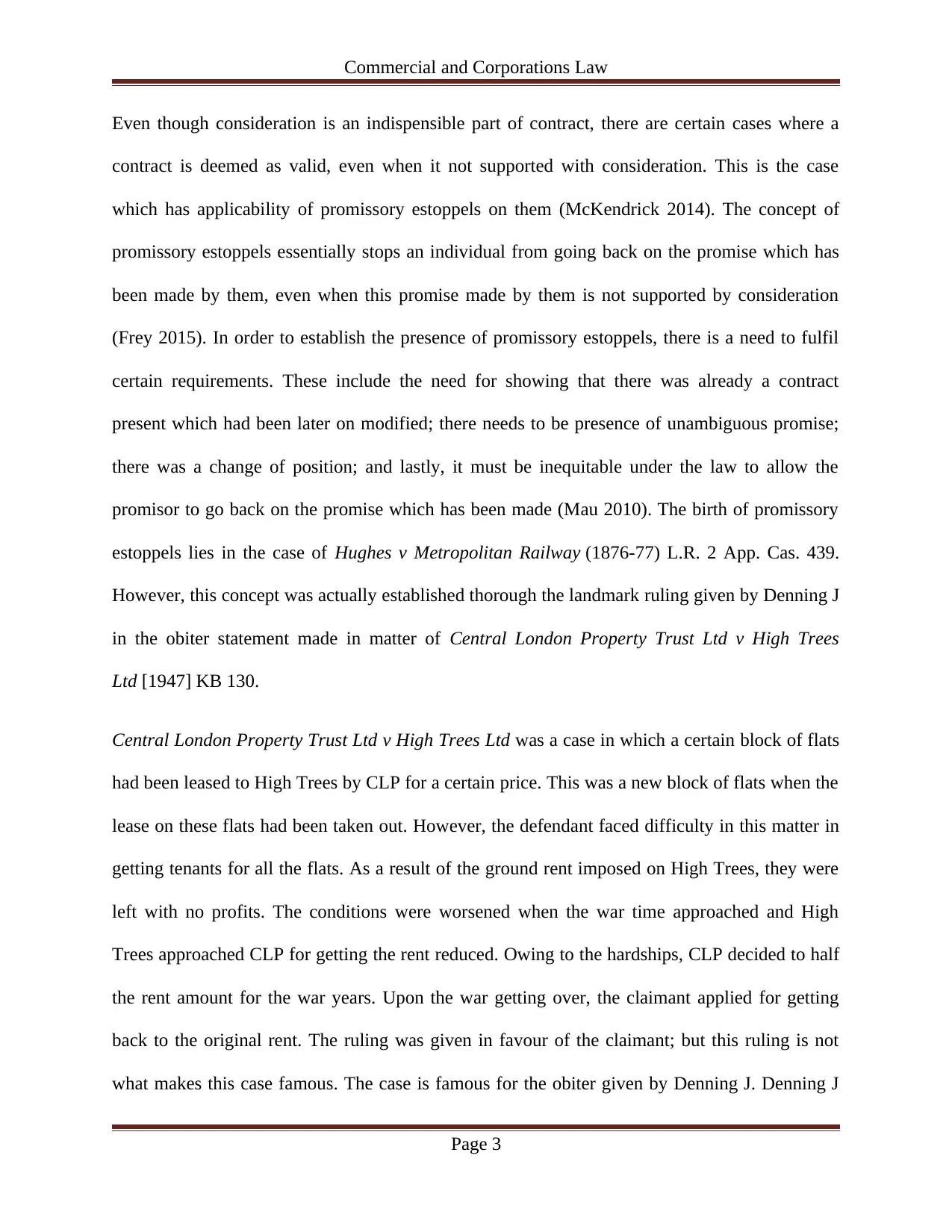
Commercial and Corporations Law
Even though consideration is an indispensible part of contract, there are certain cases where a
contract is deemed as valid, even when it not supported with consideration. This is the case
which has applicability of promissory estoppels on them (McKendrick 2014). The concept of
promissory estoppels essentially stops an individual from going back on the promise which has
been made by them, even when this promise made by them is not supported by consideration
(Frey 2015). In order to establish the presence of promissory estoppels, there is a need to fulfil
certain requirements. These include the need for showing that there was already a contract
present which had been later on modified; there needs to be presence of unambiguous promise;
there was a change of position; and lastly, it must be inequitable under the law to allow the
promisor to go back on the promise which has been made (Mau 2010). The birth of promissory
estoppels lies in the case of Hughes v Metropolitan Railway (1876-77) L.R. 2 App. Cas. 439.
However, this concept was actually established thorough the landmark ruling given by Denning J
in the obiter statement made in matter of Central London Property Trust Ltd v High Trees
Ltd [1947] KB 130.
Central London Property Trust Ltd v High Trees Ltd was a case in which a certain block of flats
had been leased to High Trees by CLP for a certain price. This was a new block of flats when the
lease on these flats had been taken out. However, the defendant faced difficulty in this matter in
getting tenants for all the flats. As a result of the ground rent imposed on High Trees, they were
left with no profits. The conditions were worsened when the war time approached and High
Trees approached CLP for getting the rent reduced. Owing to the hardships, CLP decided to half
the rent amount for the war years. Upon the war getting over, the claimant applied for getting
back to the original rent. The ruling was given in favour of the claimant; but this ruling is not
what makes this case famous. The case is famous for the obiter given by Denning J. Denning J
Page 3
Even though consideration is an indispensible part of contract, there are certain cases where a
contract is deemed as valid, even when it not supported with consideration. This is the case
which has applicability of promissory estoppels on them (McKendrick 2014). The concept of
promissory estoppels essentially stops an individual from going back on the promise which has
been made by them, even when this promise made by them is not supported by consideration
(Frey 2015). In order to establish the presence of promissory estoppels, there is a need to fulfil
certain requirements. These include the need for showing that there was already a contract
present which had been later on modified; there needs to be presence of unambiguous promise;
there was a change of position; and lastly, it must be inequitable under the law to allow the
promisor to go back on the promise which has been made (Mau 2010). The birth of promissory
estoppels lies in the case of Hughes v Metropolitan Railway (1876-77) L.R. 2 App. Cas. 439.
However, this concept was actually established thorough the landmark ruling given by Denning J
in the obiter statement made in matter of Central London Property Trust Ltd v High Trees
Ltd [1947] KB 130.
Central London Property Trust Ltd v High Trees Ltd was a case in which a certain block of flats
had been leased to High Trees by CLP for a certain price. This was a new block of flats when the
lease on these flats had been taken out. However, the defendant faced difficulty in this matter in
getting tenants for all the flats. As a result of the ground rent imposed on High Trees, they were
left with no profits. The conditions were worsened when the war time approached and High
Trees approached CLP for getting the rent reduced. Owing to the hardships, CLP decided to half
the rent amount for the war years. Upon the war getting over, the claimant applied for getting
back to the original rent. The ruling was given in favour of the claimant; but this ruling is not
what makes this case famous. The case is famous for the obiter given by Denning J. Denning J
Page 3
⊘ This is a preview!⊘
Do you want full access?
Subscribe today to unlock all pages.

Trusted by 1+ million students worldwide
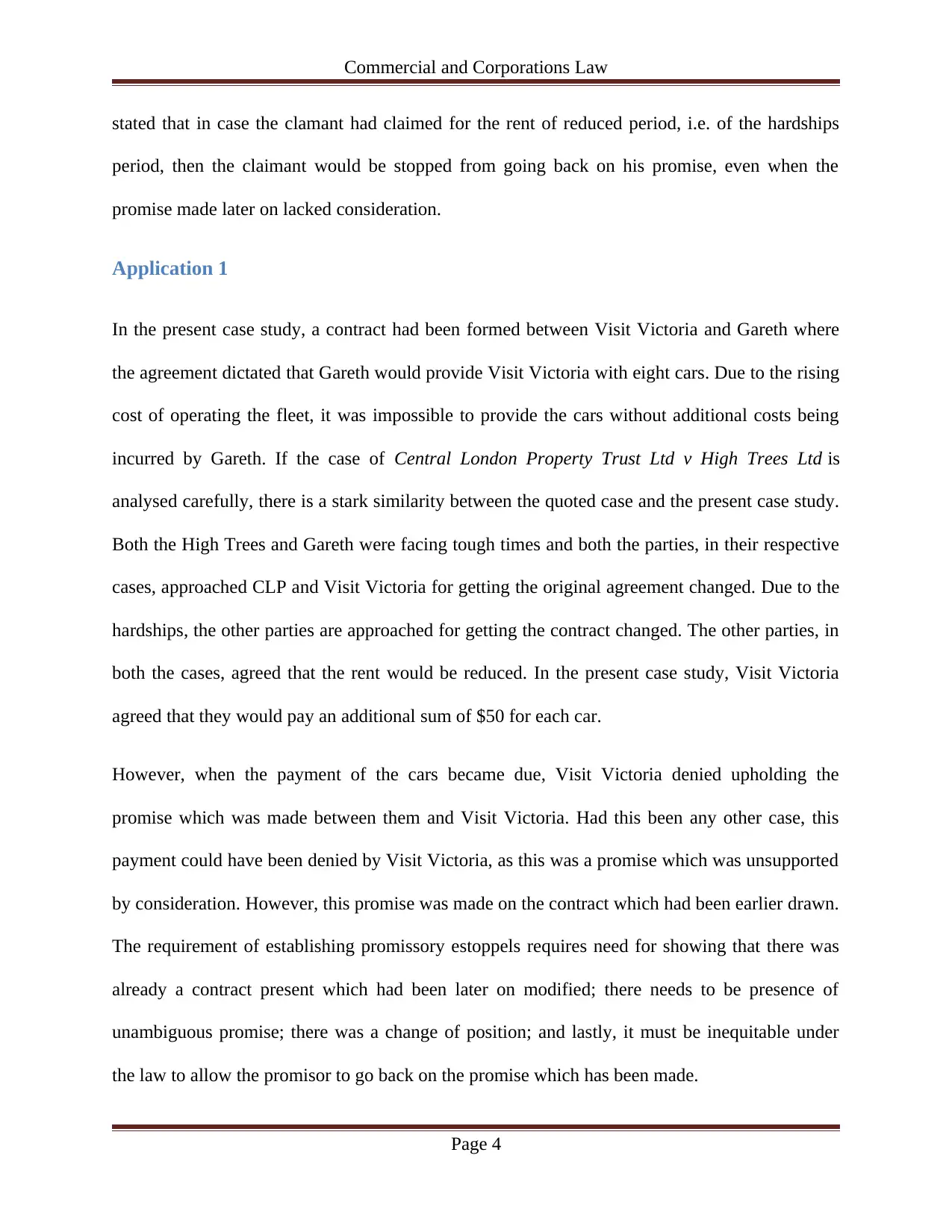
Commercial and Corporations Law
stated that in case the clamant had claimed for the rent of reduced period, i.e. of the hardships
period, then the claimant would be stopped from going back on his promise, even when the
promise made later on lacked consideration.
Application 1
In the present case study, a contract had been formed between Visit Victoria and Gareth where
the agreement dictated that Gareth would provide Visit Victoria with eight cars. Due to the rising
cost of operating the fleet, it was impossible to provide the cars without additional costs being
incurred by Gareth. If the case of Central London Property Trust Ltd v High Trees Ltd is
analysed carefully, there is a stark similarity between the quoted case and the present case study.
Both the High Trees and Gareth were facing tough times and both the parties, in their respective
cases, approached CLP and Visit Victoria for getting the original agreement changed. Due to the
hardships, the other parties are approached for getting the contract changed. The other parties, in
both the cases, agreed that the rent would be reduced. In the present case study, Visit Victoria
agreed that they would pay an additional sum of $50 for each car.
However, when the payment of the cars became due, Visit Victoria denied upholding the
promise which was made between them and Visit Victoria. Had this been any other case, this
payment could have been denied by Visit Victoria, as this was a promise which was unsupported
by consideration. However, this promise was made on the contract which had been earlier drawn.
The requirement of establishing promissory estoppels requires need for showing that there was
already a contract present which had been later on modified; there needs to be presence of
unambiguous promise; there was a change of position; and lastly, it must be inequitable under
the law to allow the promisor to go back on the promise which has been made.
Page 4
stated that in case the clamant had claimed for the rent of reduced period, i.e. of the hardships
period, then the claimant would be stopped from going back on his promise, even when the
promise made later on lacked consideration.
Application 1
In the present case study, a contract had been formed between Visit Victoria and Gareth where
the agreement dictated that Gareth would provide Visit Victoria with eight cars. Due to the rising
cost of operating the fleet, it was impossible to provide the cars without additional costs being
incurred by Gareth. If the case of Central London Property Trust Ltd v High Trees Ltd is
analysed carefully, there is a stark similarity between the quoted case and the present case study.
Both the High Trees and Gareth were facing tough times and both the parties, in their respective
cases, approached CLP and Visit Victoria for getting the original agreement changed. Due to the
hardships, the other parties are approached for getting the contract changed. The other parties, in
both the cases, agreed that the rent would be reduced. In the present case study, Visit Victoria
agreed that they would pay an additional sum of $50 for each car.
However, when the payment of the cars became due, Visit Victoria denied upholding the
promise which was made between them and Visit Victoria. Had this been any other case, this
payment could have been denied by Visit Victoria, as this was a promise which was unsupported
by consideration. However, this promise was made on the contract which had been earlier drawn.
The requirement of establishing promissory estoppels requires need for showing that there was
already a contract present which had been later on modified; there needs to be presence of
unambiguous promise; there was a change of position; and lastly, it must be inequitable under
the law to allow the promisor to go back on the promise which has been made.
Page 4
Paraphrase This Document
Need a fresh take? Get an instant paraphrase of this document with our AI Paraphraser
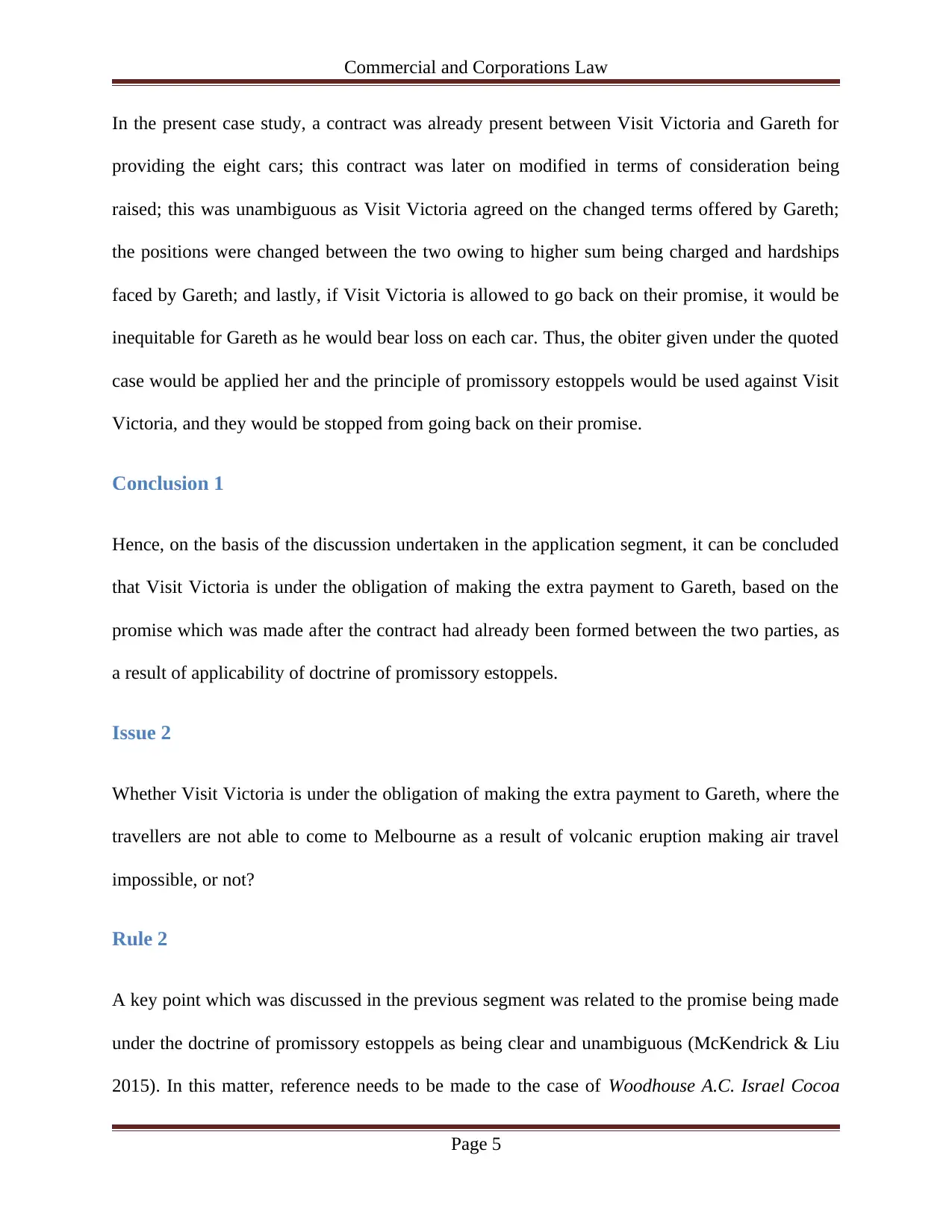
Commercial and Corporations Law
In the present case study, a contract was already present between Visit Victoria and Gareth for
providing the eight cars; this contract was later on modified in terms of consideration being
raised; this was unambiguous as Visit Victoria agreed on the changed terms offered by Gareth;
the positions were changed between the two owing to higher sum being charged and hardships
faced by Gareth; and lastly, if Visit Victoria is allowed to go back on their promise, it would be
inequitable for Gareth as he would bear loss on each car. Thus, the obiter given under the quoted
case would be applied her and the principle of promissory estoppels would be used against Visit
Victoria, and they would be stopped from going back on their promise.
Conclusion 1
Hence, on the basis of the discussion undertaken in the application segment, it can be concluded
that Visit Victoria is under the obligation of making the extra payment to Gareth, based on the
promise which was made after the contract had already been formed between the two parties, as
a result of applicability of doctrine of promissory estoppels.
Issue 2
Whether Visit Victoria is under the obligation of making the extra payment to Gareth, where the
travellers are not able to come to Melbourne as a result of volcanic eruption making air travel
impossible, or not?
Rule 2
A key point which was discussed in the previous segment was related to the promise being made
under the doctrine of promissory estoppels as being clear and unambiguous (McKendrick & Liu
2015). In this matter, reference needs to be made to the case of Woodhouse A.C. Israel Cocoa
Page 5
In the present case study, a contract was already present between Visit Victoria and Gareth for
providing the eight cars; this contract was later on modified in terms of consideration being
raised; this was unambiguous as Visit Victoria agreed on the changed terms offered by Gareth;
the positions were changed between the two owing to higher sum being charged and hardships
faced by Gareth; and lastly, if Visit Victoria is allowed to go back on their promise, it would be
inequitable for Gareth as he would bear loss on each car. Thus, the obiter given under the quoted
case would be applied her and the principle of promissory estoppels would be used against Visit
Victoria, and they would be stopped from going back on their promise.
Conclusion 1
Hence, on the basis of the discussion undertaken in the application segment, it can be concluded
that Visit Victoria is under the obligation of making the extra payment to Gareth, based on the
promise which was made after the contract had already been formed between the two parties, as
a result of applicability of doctrine of promissory estoppels.
Issue 2
Whether Visit Victoria is under the obligation of making the extra payment to Gareth, where the
travellers are not able to come to Melbourne as a result of volcanic eruption making air travel
impossible, or not?
Rule 2
A key point which was discussed in the previous segment was related to the promise being made
under the doctrine of promissory estoppels as being clear and unambiguous (McKendrick & Liu
2015). In this matter, reference needs to be made to the case of Woodhouse A.C. Israel Cocoa
Page 5
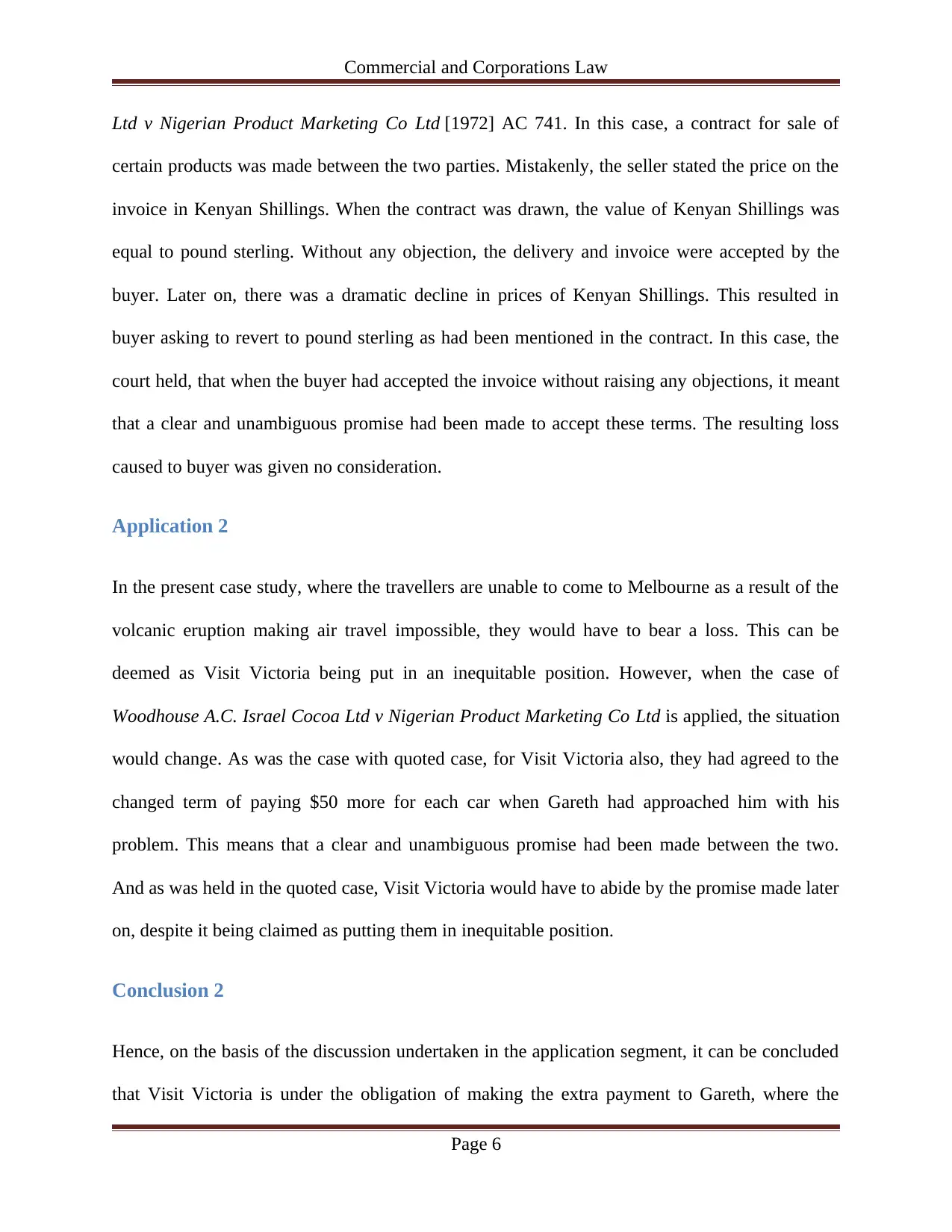
Commercial and Corporations Law
Ltd v Nigerian Product Marketing Co Ltd [1972] AC 741. In this case, a contract for sale of
certain products was made between the two parties. Mistakenly, the seller stated the price on the
invoice in Kenyan Shillings. When the contract was drawn, the value of Kenyan Shillings was
equal to pound sterling. Without any objection, the delivery and invoice were accepted by the
buyer. Later on, there was a dramatic decline in prices of Kenyan Shillings. This resulted in
buyer asking to revert to pound sterling as had been mentioned in the contract. In this case, the
court held, that when the buyer had accepted the invoice without raising any objections, it meant
that a clear and unambiguous promise had been made to accept these terms. The resulting loss
caused to buyer was given no consideration.
Application 2
In the present case study, where the travellers are unable to come to Melbourne as a result of the
volcanic eruption making air travel impossible, they would have to bear a loss. This can be
deemed as Visit Victoria being put in an inequitable position. However, when the case of
Woodhouse A.C. Israel Cocoa Ltd v Nigerian Product Marketing Co Ltd is applied, the situation
would change. As was the case with quoted case, for Visit Victoria also, they had agreed to the
changed term of paying $50 more for each car when Gareth had approached him with his
problem. This means that a clear and unambiguous promise had been made between the two.
And as was held in the quoted case, Visit Victoria would have to abide by the promise made later
on, despite it being claimed as putting them in inequitable position.
Conclusion 2
Hence, on the basis of the discussion undertaken in the application segment, it can be concluded
that Visit Victoria is under the obligation of making the extra payment to Gareth, where the
Page 6
Ltd v Nigerian Product Marketing Co Ltd [1972] AC 741. In this case, a contract for sale of
certain products was made between the two parties. Mistakenly, the seller stated the price on the
invoice in Kenyan Shillings. When the contract was drawn, the value of Kenyan Shillings was
equal to pound sterling. Without any objection, the delivery and invoice were accepted by the
buyer. Later on, there was a dramatic decline in prices of Kenyan Shillings. This resulted in
buyer asking to revert to pound sterling as had been mentioned in the contract. In this case, the
court held, that when the buyer had accepted the invoice without raising any objections, it meant
that a clear and unambiguous promise had been made to accept these terms. The resulting loss
caused to buyer was given no consideration.
Application 2
In the present case study, where the travellers are unable to come to Melbourne as a result of the
volcanic eruption making air travel impossible, they would have to bear a loss. This can be
deemed as Visit Victoria being put in an inequitable position. However, when the case of
Woodhouse A.C. Israel Cocoa Ltd v Nigerian Product Marketing Co Ltd is applied, the situation
would change. As was the case with quoted case, for Visit Victoria also, they had agreed to the
changed term of paying $50 more for each car when Gareth had approached him with his
problem. This means that a clear and unambiguous promise had been made between the two.
And as was held in the quoted case, Visit Victoria would have to abide by the promise made later
on, despite it being claimed as putting them in inequitable position.
Conclusion 2
Hence, on the basis of the discussion undertaken in the application segment, it can be concluded
that Visit Victoria is under the obligation of making the extra payment to Gareth, where the
Page 6
⊘ This is a preview!⊘
Do you want full access?
Subscribe today to unlock all pages.

Trusted by 1+ million students worldwide
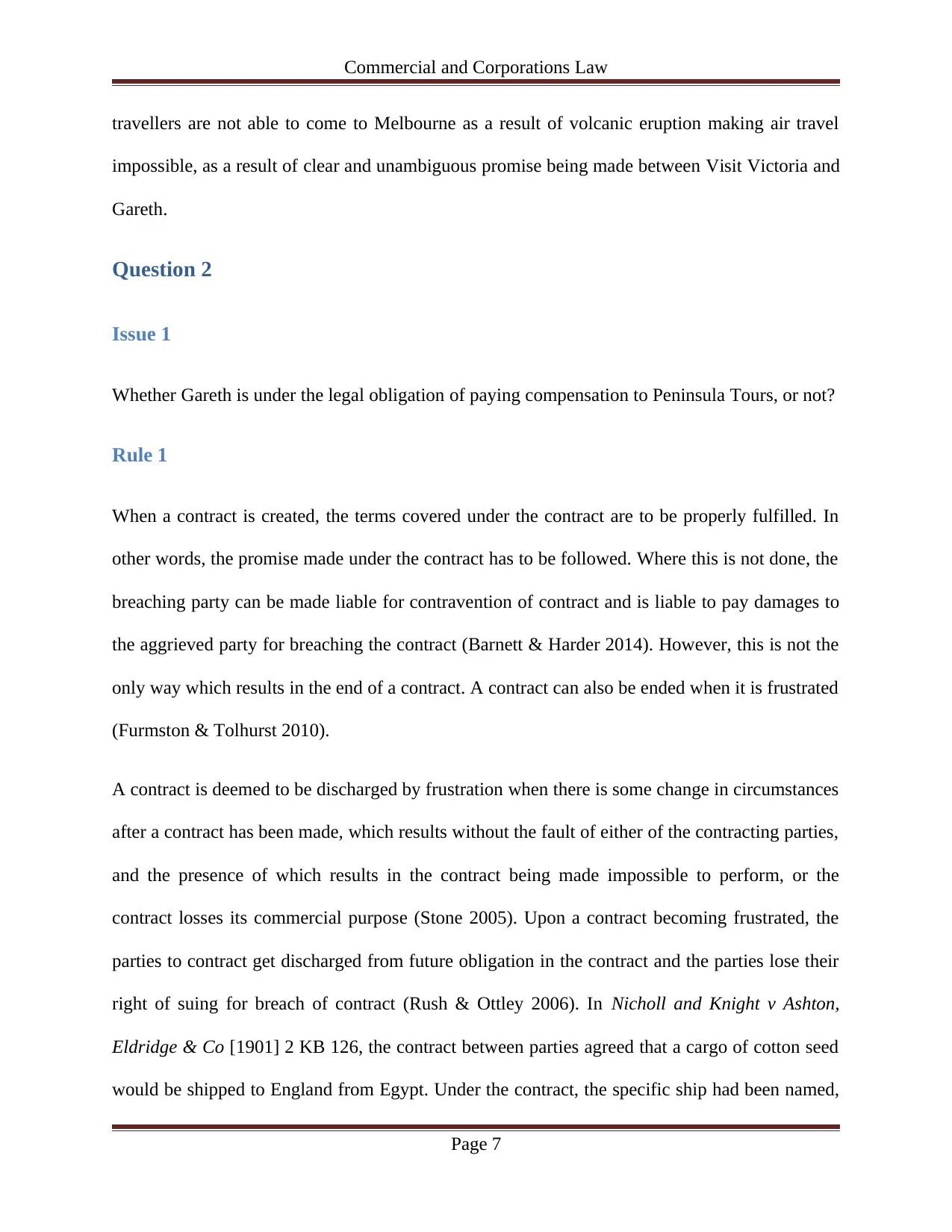
Commercial and Corporations Law
travellers are not able to come to Melbourne as a result of volcanic eruption making air travel
impossible, as a result of clear and unambiguous promise being made between Visit Victoria and
Gareth.
Question 2
Issue 1
Whether Gareth is under the legal obligation of paying compensation to Peninsula Tours, or not?
Rule 1
When a contract is created, the terms covered under the contract are to be properly fulfilled. In
other words, the promise made under the contract has to be followed. Where this is not done, the
breaching party can be made liable for contravention of contract and is liable to pay damages to
the aggrieved party for breaching the contract (Barnett & Harder 2014). However, this is not the
only way which results in the end of a contract. A contract can also be ended when it is frustrated
(Furmston & Tolhurst 2010).
A contract is deemed to be discharged by frustration when there is some change in circumstances
after a contract has been made, which results without the fault of either of the contracting parties,
and the presence of which results in the contract being made impossible to perform, or the
contract losses its commercial purpose (Stone 2005). Upon a contract becoming frustrated, the
parties to contract get discharged from future obligation in the contract and the parties lose their
right of suing for breach of contract (Rush & Ottley 2006). In Nicholl and Knight v Ashton,
Eldridge & Co [1901] 2 KB 126, the contract between parties agreed that a cargo of cotton seed
would be shipped to England from Egypt. Under the contract, the specific ship had been named,
Page 7
travellers are not able to come to Melbourne as a result of volcanic eruption making air travel
impossible, as a result of clear and unambiguous promise being made between Visit Victoria and
Gareth.
Question 2
Issue 1
Whether Gareth is under the legal obligation of paying compensation to Peninsula Tours, or not?
Rule 1
When a contract is created, the terms covered under the contract are to be properly fulfilled. In
other words, the promise made under the contract has to be followed. Where this is not done, the
breaching party can be made liable for contravention of contract and is liable to pay damages to
the aggrieved party for breaching the contract (Barnett & Harder 2014). However, this is not the
only way which results in the end of a contract. A contract can also be ended when it is frustrated
(Furmston & Tolhurst 2010).
A contract is deemed to be discharged by frustration when there is some change in circumstances
after a contract has been made, which results without the fault of either of the contracting parties,
and the presence of which results in the contract being made impossible to perform, or the
contract losses its commercial purpose (Stone 2005). Upon a contract becoming frustrated, the
parties to contract get discharged from future obligation in the contract and the parties lose their
right of suing for breach of contract (Rush & Ottley 2006). In Nicholl and Knight v Ashton,
Eldridge & Co [1901] 2 KB 126, the contract between parties agreed that a cargo of cotton seed
would be shipped to England from Egypt. Under the contract, the specific ship had been named,
Page 7
Paraphrase This Document
Need a fresh take? Get an instant paraphrase of this document with our AI Paraphraser
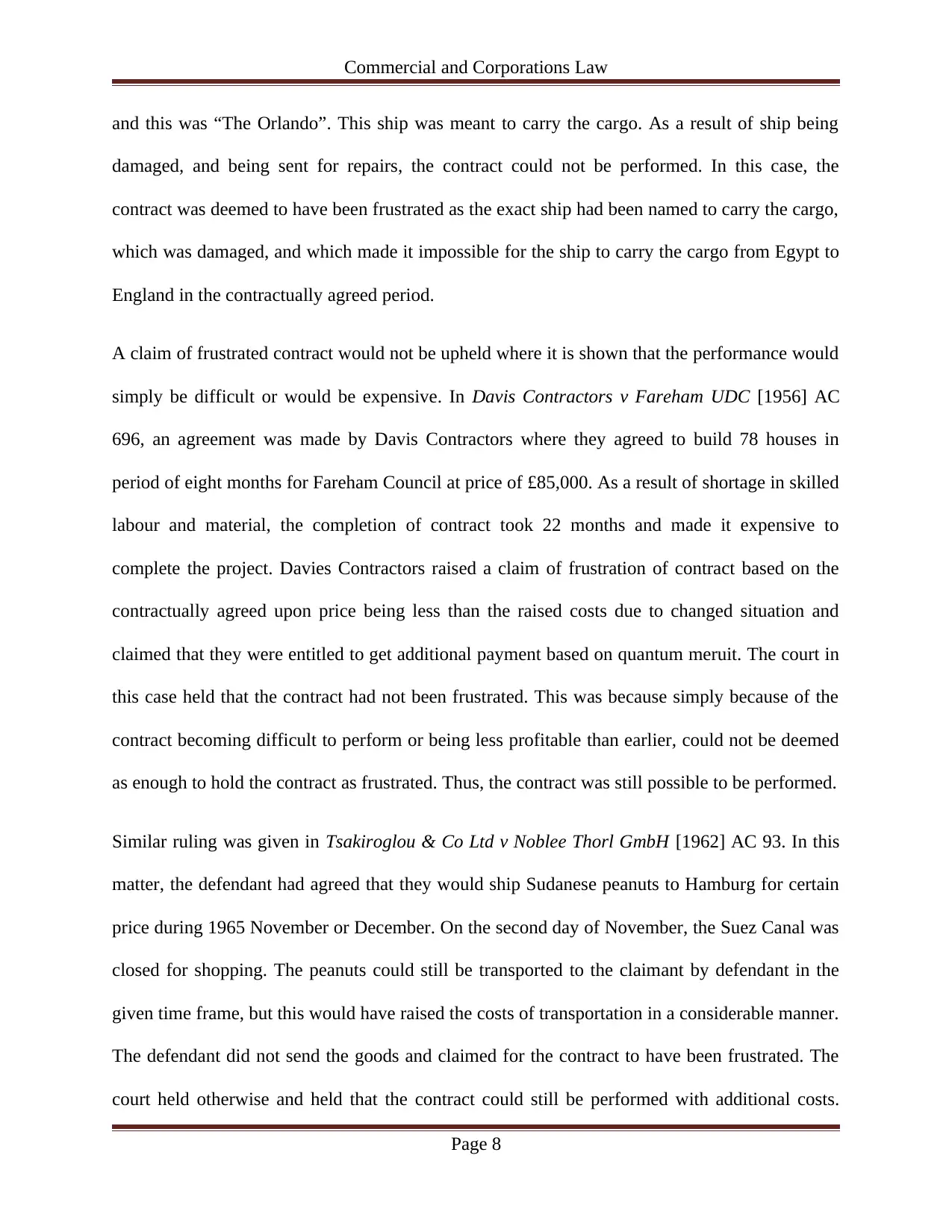
Commercial and Corporations Law
and this was “The Orlando”. This ship was meant to carry the cargo. As a result of ship being
damaged, and being sent for repairs, the contract could not be performed. In this case, the
contract was deemed to have been frustrated as the exact ship had been named to carry the cargo,
which was damaged, and which made it impossible for the ship to carry the cargo from Egypt to
England in the contractually agreed period.
A claim of frustrated contract would not be upheld where it is shown that the performance would
simply be difficult or would be expensive. In Davis Contractors v Fareham UDC [1956] AC
696, an agreement was made by Davis Contractors where they agreed to build 78 houses in
period of eight months for Fareham Council at price of £85,000. As a result of shortage in skilled
labour and material, the completion of contract took 22 months and made it expensive to
complete the project. Davies Contractors raised a claim of frustration of contract based on the
contractually agreed upon price being less than the raised costs due to changed situation and
claimed that they were entitled to get additional payment based on quantum meruit. The court in
this case held that the contract had not been frustrated. This was because simply because of the
contract becoming difficult to perform or being less profitable than earlier, could not be deemed
as enough to hold the contract as frustrated. Thus, the contract was still possible to be performed.
Similar ruling was given in Tsakiroglou & Co Ltd v Noblee Thorl GmbH [1962] AC 93. In this
matter, the defendant had agreed that they would ship Sudanese peanuts to Hamburg for certain
price during 1965 November or December. On the second day of November, the Suez Canal was
closed for shopping. The peanuts could still be transported to the claimant by defendant in the
given time frame, but this would have raised the costs of transportation in a considerable manner.
The defendant did not send the goods and claimed for the contract to have been frustrated. The
court held otherwise and held that the contract could still be performed with additional costs.
Page 8
and this was “The Orlando”. This ship was meant to carry the cargo. As a result of ship being
damaged, and being sent for repairs, the contract could not be performed. In this case, the
contract was deemed to have been frustrated as the exact ship had been named to carry the cargo,
which was damaged, and which made it impossible for the ship to carry the cargo from Egypt to
England in the contractually agreed period.
A claim of frustrated contract would not be upheld where it is shown that the performance would
simply be difficult or would be expensive. In Davis Contractors v Fareham UDC [1956] AC
696, an agreement was made by Davis Contractors where they agreed to build 78 houses in
period of eight months for Fareham Council at price of £85,000. As a result of shortage in skilled
labour and material, the completion of contract took 22 months and made it expensive to
complete the project. Davies Contractors raised a claim of frustration of contract based on the
contractually agreed upon price being less than the raised costs due to changed situation and
claimed that they were entitled to get additional payment based on quantum meruit. The court in
this case held that the contract had not been frustrated. This was because simply because of the
contract becoming difficult to perform or being less profitable than earlier, could not be deemed
as enough to hold the contract as frustrated. Thus, the contract was still possible to be performed.
Similar ruling was given in Tsakiroglou & Co Ltd v Noblee Thorl GmbH [1962] AC 93. In this
matter, the defendant had agreed that they would ship Sudanese peanuts to Hamburg for certain
price during 1965 November or December. On the second day of November, the Suez Canal was
closed for shopping. The peanuts could still be transported to the claimant by defendant in the
given time frame, but this would have raised the costs of transportation in a considerable manner.
The defendant did not send the goods and claimed for the contract to have been frustrated. The
court held otherwise and held that the contract could still be performed with additional costs.
Page 8
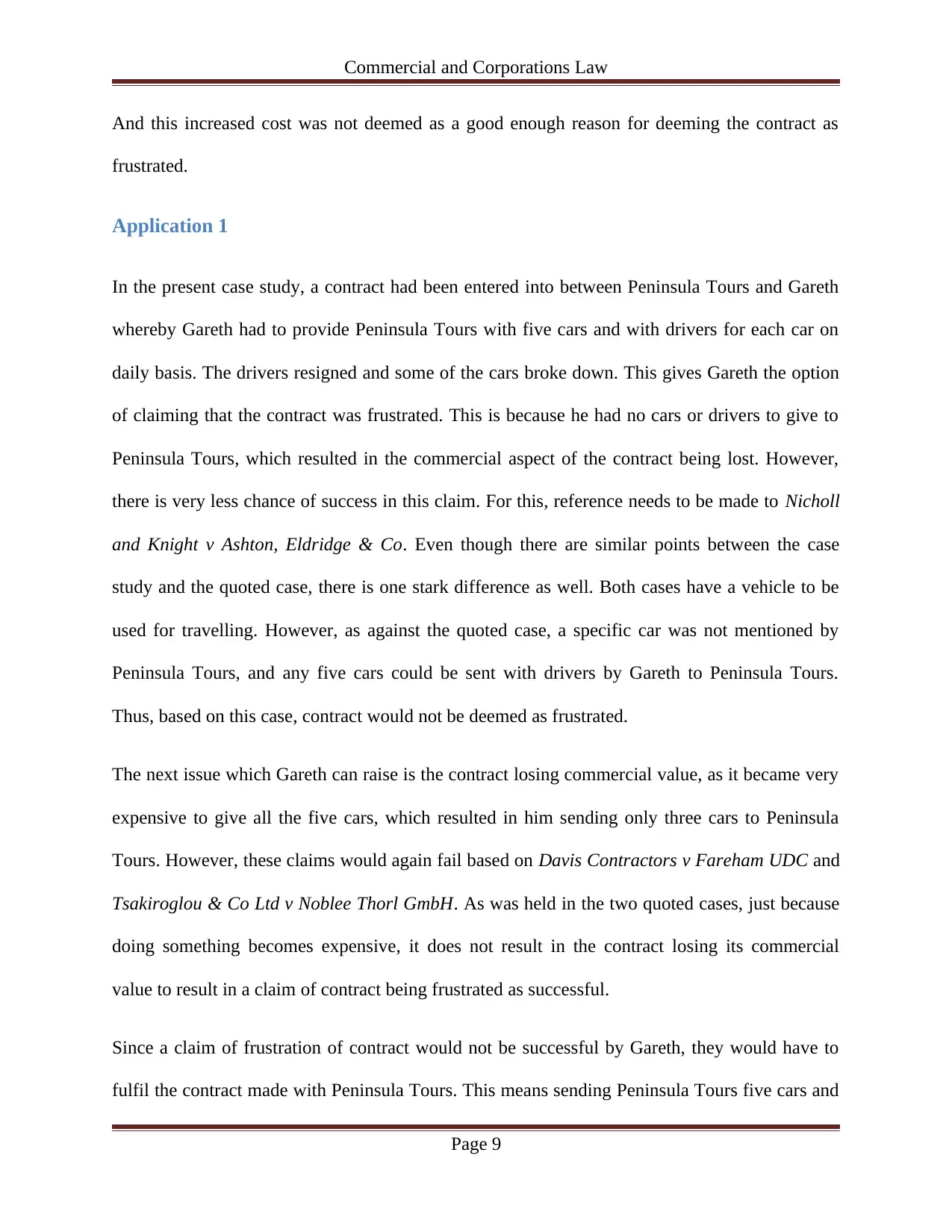
Commercial and Corporations Law
And this increased cost was not deemed as a good enough reason for deeming the contract as
frustrated.
Application 1
In the present case study, a contract had been entered into between Peninsula Tours and Gareth
whereby Gareth had to provide Peninsula Tours with five cars and with drivers for each car on
daily basis. The drivers resigned and some of the cars broke down. This gives Gareth the option
of claiming that the contract was frustrated. This is because he had no cars or drivers to give to
Peninsula Tours, which resulted in the commercial aspect of the contract being lost. However,
there is very less chance of success in this claim. For this, reference needs to be made to Nicholl
and Knight v Ashton, Eldridge & Co. Even though there are similar points between the case
study and the quoted case, there is one stark difference as well. Both cases have a vehicle to be
used for travelling. However, as against the quoted case, a specific car was not mentioned by
Peninsula Tours, and any five cars could be sent with drivers by Gareth to Peninsula Tours.
Thus, based on this case, contract would not be deemed as frustrated.
The next issue which Gareth can raise is the contract losing commercial value, as it became very
expensive to give all the five cars, which resulted in him sending only three cars to Peninsula
Tours. However, these claims would again fail based on Davis Contractors v Fareham UDC and
Tsakiroglou & Co Ltd v Noblee Thorl GmbH. As was held in the two quoted cases, just because
doing something becomes expensive, it does not result in the contract losing its commercial
value to result in a claim of contract being frustrated as successful.
Since a claim of frustration of contract would not be successful by Gareth, they would have to
fulfil the contract made with Peninsula Tours. This means sending Peninsula Tours five cars and
Page 9
And this increased cost was not deemed as a good enough reason for deeming the contract as
frustrated.
Application 1
In the present case study, a contract had been entered into between Peninsula Tours and Gareth
whereby Gareth had to provide Peninsula Tours with five cars and with drivers for each car on
daily basis. The drivers resigned and some of the cars broke down. This gives Gareth the option
of claiming that the contract was frustrated. This is because he had no cars or drivers to give to
Peninsula Tours, which resulted in the commercial aspect of the contract being lost. However,
there is very less chance of success in this claim. For this, reference needs to be made to Nicholl
and Knight v Ashton, Eldridge & Co. Even though there are similar points between the case
study and the quoted case, there is one stark difference as well. Both cases have a vehicle to be
used for travelling. However, as against the quoted case, a specific car was not mentioned by
Peninsula Tours, and any five cars could be sent with drivers by Gareth to Peninsula Tours.
Thus, based on this case, contract would not be deemed as frustrated.
The next issue which Gareth can raise is the contract losing commercial value, as it became very
expensive to give all the five cars, which resulted in him sending only three cars to Peninsula
Tours. However, these claims would again fail based on Davis Contractors v Fareham UDC and
Tsakiroglou & Co Ltd v Noblee Thorl GmbH. As was held in the two quoted cases, just because
doing something becomes expensive, it does not result in the contract losing its commercial
value to result in a claim of contract being frustrated as successful.
Since a claim of frustration of contract would not be successful by Gareth, they would have to
fulfil the contract made with Peninsula Tours. This means sending Peninsula Tours five cars and
Page 9
⊘ This is a preview!⊘
Do you want full access?
Subscribe today to unlock all pages.

Trusted by 1+ million students worldwide
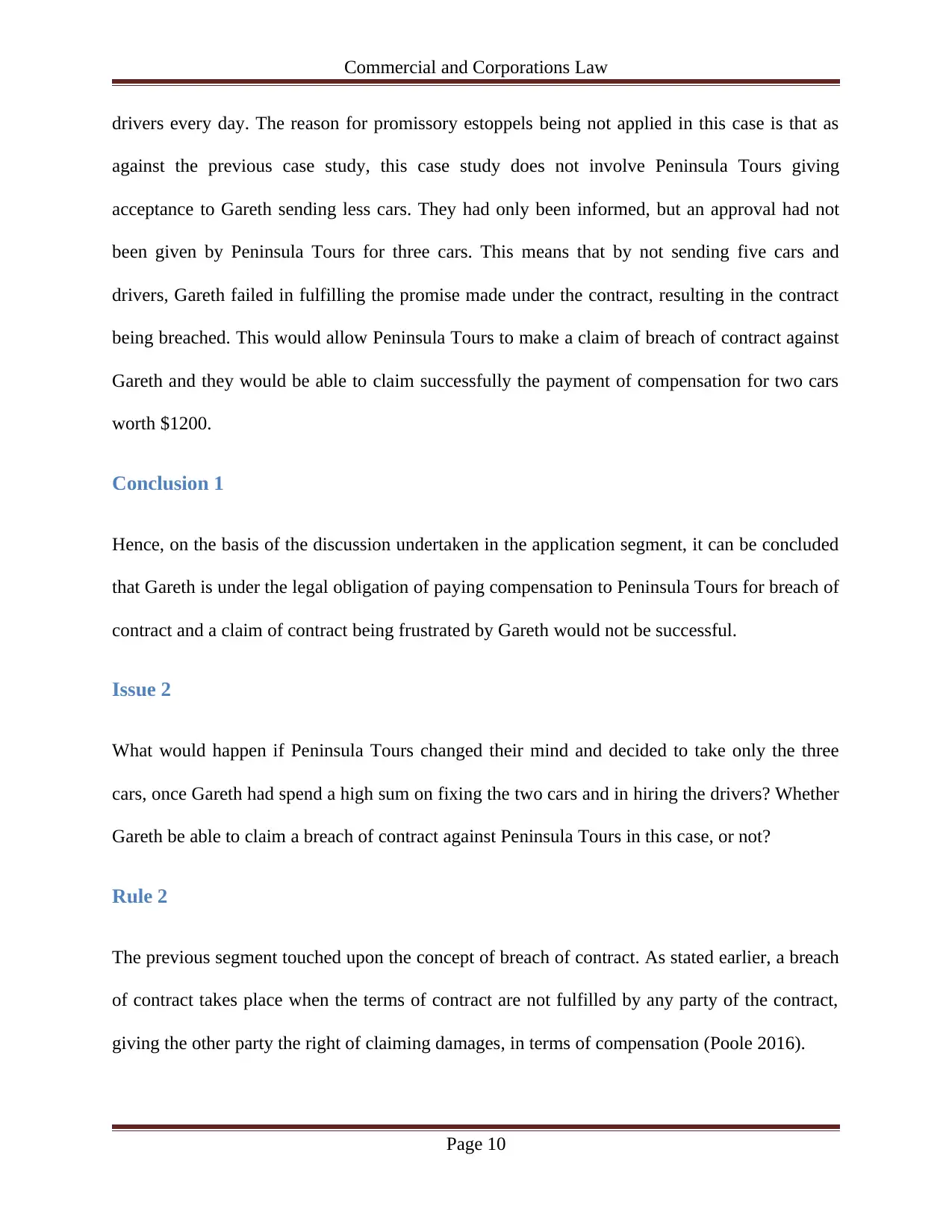
Commercial and Corporations Law
drivers every day. The reason for promissory estoppels being not applied in this case is that as
against the previous case study, this case study does not involve Peninsula Tours giving
acceptance to Gareth sending less cars. They had only been informed, but an approval had not
been given by Peninsula Tours for three cars. This means that by not sending five cars and
drivers, Gareth failed in fulfilling the promise made under the contract, resulting in the contract
being breached. This would allow Peninsula Tours to make a claim of breach of contract against
Gareth and they would be able to claim successfully the payment of compensation for two cars
worth $1200.
Conclusion 1
Hence, on the basis of the discussion undertaken in the application segment, it can be concluded
that Gareth is under the legal obligation of paying compensation to Peninsula Tours for breach of
contract and a claim of contract being frustrated by Gareth would not be successful.
Issue 2
What would happen if Peninsula Tours changed their mind and decided to take only the three
cars, once Gareth had spend a high sum on fixing the two cars and in hiring the drivers? Whether
Gareth be able to claim a breach of contract against Peninsula Tours in this case, or not?
Rule 2
The previous segment touched upon the concept of breach of contract. As stated earlier, a breach
of contract takes place when the terms of contract are not fulfilled by any party of the contract,
giving the other party the right of claiming damages, in terms of compensation (Poole 2016).
Page 10
drivers every day. The reason for promissory estoppels being not applied in this case is that as
against the previous case study, this case study does not involve Peninsula Tours giving
acceptance to Gareth sending less cars. They had only been informed, but an approval had not
been given by Peninsula Tours for three cars. This means that by not sending five cars and
drivers, Gareth failed in fulfilling the promise made under the contract, resulting in the contract
being breached. This would allow Peninsula Tours to make a claim of breach of contract against
Gareth and they would be able to claim successfully the payment of compensation for two cars
worth $1200.
Conclusion 1
Hence, on the basis of the discussion undertaken in the application segment, it can be concluded
that Gareth is under the legal obligation of paying compensation to Peninsula Tours for breach of
contract and a claim of contract being frustrated by Gareth would not be successful.
Issue 2
What would happen if Peninsula Tours changed their mind and decided to take only the three
cars, once Gareth had spend a high sum on fixing the two cars and in hiring the drivers? Whether
Gareth be able to claim a breach of contract against Peninsula Tours in this case, or not?
Rule 2
The previous segment touched upon the concept of breach of contract. As stated earlier, a breach
of contract takes place when the terms of contract are not fulfilled by any party of the contract,
giving the other party the right of claiming damages, in terms of compensation (Poole 2016).
Page 10
Paraphrase This Document
Need a fresh take? Get an instant paraphrase of this document with our AI Paraphraser
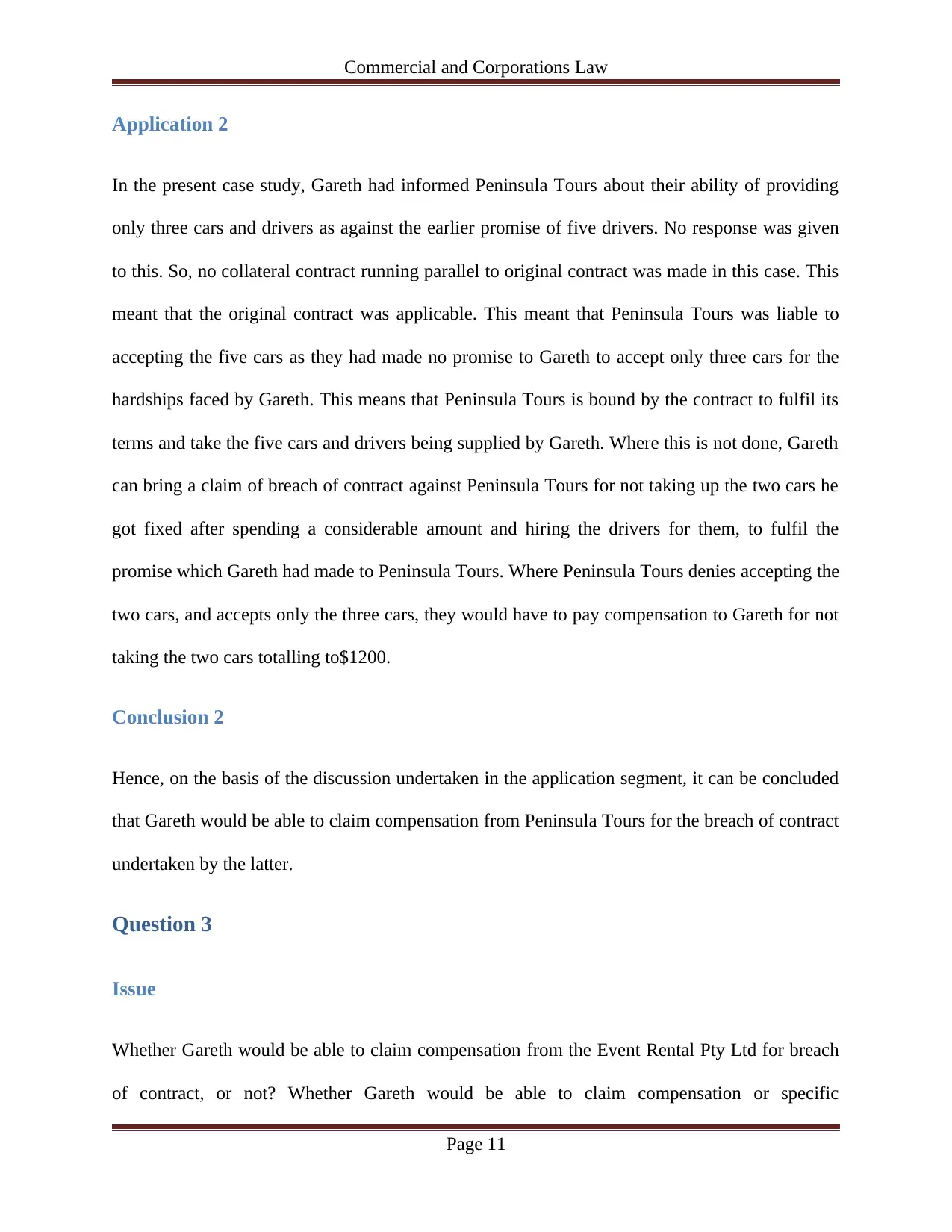
Commercial and Corporations Law
Application 2
In the present case study, Gareth had informed Peninsula Tours about their ability of providing
only three cars and drivers as against the earlier promise of five drivers. No response was given
to this. So, no collateral contract running parallel to original contract was made in this case. This
meant that the original contract was applicable. This meant that Peninsula Tours was liable to
accepting the five cars as they had made no promise to Gareth to accept only three cars for the
hardships faced by Gareth. This means that Peninsula Tours is bound by the contract to fulfil its
terms and take the five cars and drivers being supplied by Gareth. Where this is not done, Gareth
can bring a claim of breach of contract against Peninsula Tours for not taking up the two cars he
got fixed after spending a considerable amount and hiring the drivers for them, to fulfil the
promise which Gareth had made to Peninsula Tours. Where Peninsula Tours denies accepting the
two cars, and accepts only the three cars, they would have to pay compensation to Gareth for not
taking the two cars totalling to$1200.
Conclusion 2
Hence, on the basis of the discussion undertaken in the application segment, it can be concluded
that Gareth would be able to claim compensation from Peninsula Tours for the breach of contract
undertaken by the latter.
Question 3
Issue
Whether Gareth would be able to claim compensation from the Event Rental Pty Ltd for breach
of contract, or not? Whether Gareth would be able to claim compensation or specific
Page 11
Application 2
In the present case study, Gareth had informed Peninsula Tours about their ability of providing
only three cars and drivers as against the earlier promise of five drivers. No response was given
to this. So, no collateral contract running parallel to original contract was made in this case. This
meant that the original contract was applicable. This meant that Peninsula Tours was liable to
accepting the five cars as they had made no promise to Gareth to accept only three cars for the
hardships faced by Gareth. This means that Peninsula Tours is bound by the contract to fulfil its
terms and take the five cars and drivers being supplied by Gareth. Where this is not done, Gareth
can bring a claim of breach of contract against Peninsula Tours for not taking up the two cars he
got fixed after spending a considerable amount and hiring the drivers for them, to fulfil the
promise which Gareth had made to Peninsula Tours. Where Peninsula Tours denies accepting the
two cars, and accepts only the three cars, they would have to pay compensation to Gareth for not
taking the two cars totalling to$1200.
Conclusion 2
Hence, on the basis of the discussion undertaken in the application segment, it can be concluded
that Gareth would be able to claim compensation from Peninsula Tours for the breach of contract
undertaken by the latter.
Question 3
Issue
Whether Gareth would be able to claim compensation from the Event Rental Pty Ltd for breach
of contract, or not? Whether Gareth would be able to claim compensation or specific
Page 11
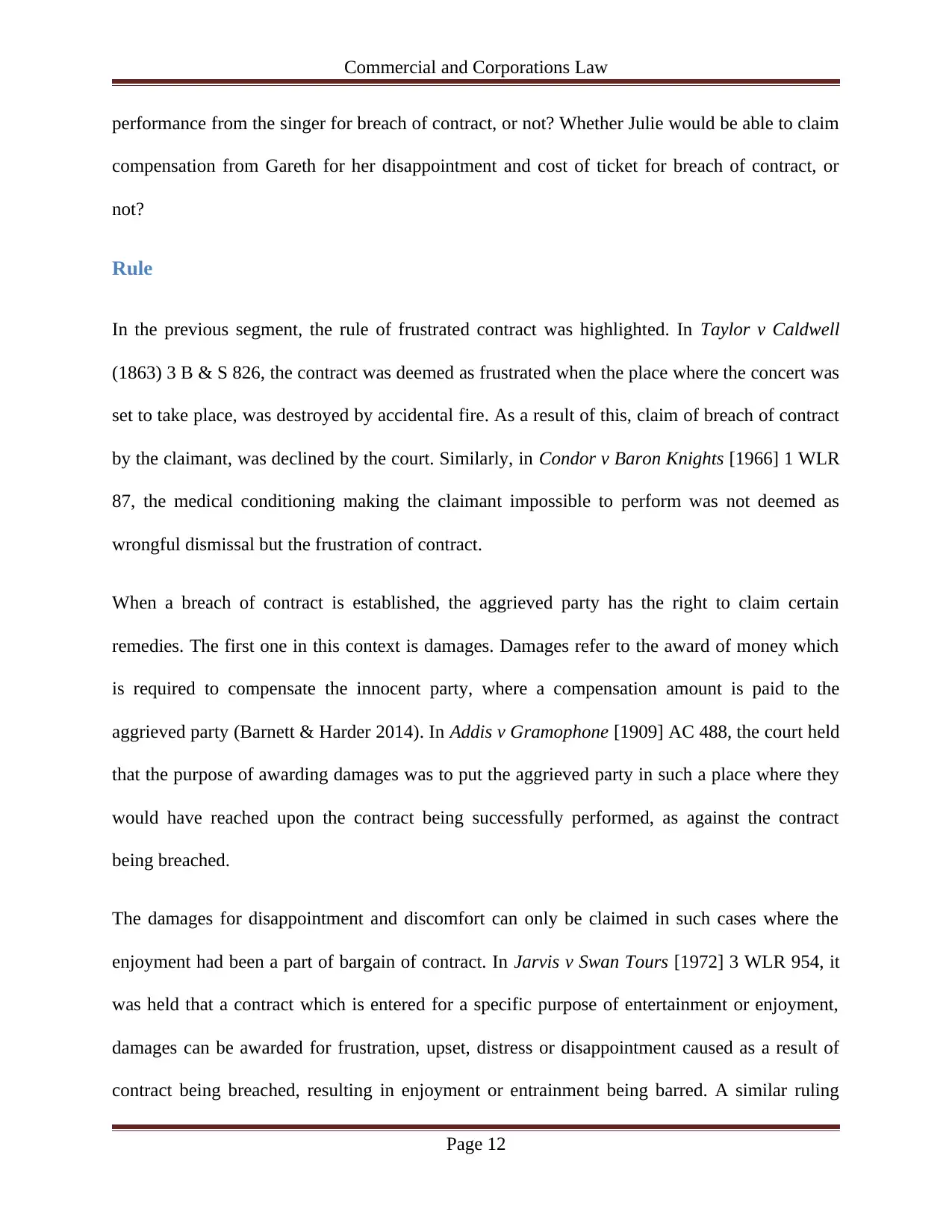
Commercial and Corporations Law
performance from the singer for breach of contract, or not? Whether Julie would be able to claim
compensation from Gareth for her disappointment and cost of ticket for breach of contract, or
not?
Rule
In the previous segment, the rule of frustrated contract was highlighted. In Taylor v Caldwell
(1863) 3 B & S 826, the contract was deemed as frustrated when the place where the concert was
set to take place, was destroyed by accidental fire. As a result of this, claim of breach of contract
by the claimant, was declined by the court. Similarly, in Condor v Baron Knights [1966] 1 WLR
87, the medical conditioning making the claimant impossible to perform was not deemed as
wrongful dismissal but the frustration of contract.
When a breach of contract is established, the aggrieved party has the right to claim certain
remedies. The first one in this context is damages. Damages refer to the award of money which
is required to compensate the innocent party, where a compensation amount is paid to the
aggrieved party (Barnett & Harder 2014). In Addis v Gramophone [1909] AC 488, the court held
that the purpose of awarding damages was to put the aggrieved party in such a place where they
would have reached upon the contract being successfully performed, as against the contract
being breached.
The damages for disappointment and discomfort can only be claimed in such cases where the
enjoyment had been a part of bargain of contract. In Jarvis v Swan Tours [1972] 3 WLR 954, it
was held that a contract which is entered for a specific purpose of entertainment or enjoyment,
damages can be awarded for frustration, upset, distress or disappointment caused as a result of
contract being breached, resulting in enjoyment or entrainment being barred. A similar ruling
Page 12
performance from the singer for breach of contract, or not? Whether Julie would be able to claim
compensation from Gareth for her disappointment and cost of ticket for breach of contract, or
not?
Rule
In the previous segment, the rule of frustrated contract was highlighted. In Taylor v Caldwell
(1863) 3 B & S 826, the contract was deemed as frustrated when the place where the concert was
set to take place, was destroyed by accidental fire. As a result of this, claim of breach of contract
by the claimant, was declined by the court. Similarly, in Condor v Baron Knights [1966] 1 WLR
87, the medical conditioning making the claimant impossible to perform was not deemed as
wrongful dismissal but the frustration of contract.
When a breach of contract is established, the aggrieved party has the right to claim certain
remedies. The first one in this context is damages. Damages refer to the award of money which
is required to compensate the innocent party, where a compensation amount is paid to the
aggrieved party (Barnett & Harder 2014). In Addis v Gramophone [1909] AC 488, the court held
that the purpose of awarding damages was to put the aggrieved party in such a place where they
would have reached upon the contract being successfully performed, as against the contract
being breached.
The damages for disappointment and discomfort can only be claimed in such cases where the
enjoyment had been a part of bargain of contract. In Jarvis v Swan Tours [1972] 3 WLR 954, it
was held that a contract which is entered for a specific purpose of entertainment or enjoyment,
damages can be awarded for frustration, upset, distress or disappointment caused as a result of
contract being breached, resulting in enjoyment or entrainment being barred. A similar ruling
Page 12
⊘ This is a preview!⊘
Do you want full access?
Subscribe today to unlock all pages.

Trusted by 1+ million students worldwide
1 out of 18
Related Documents
Your All-in-One AI-Powered Toolkit for Academic Success.
+13062052269
info@desklib.com
Available 24*7 on WhatsApp / Email
![[object Object]](/_next/static/media/star-bottom.7253800d.svg)
Unlock your academic potential
Copyright © 2020–2025 A2Z Services. All Rights Reserved. Developed and managed by ZUCOL.





